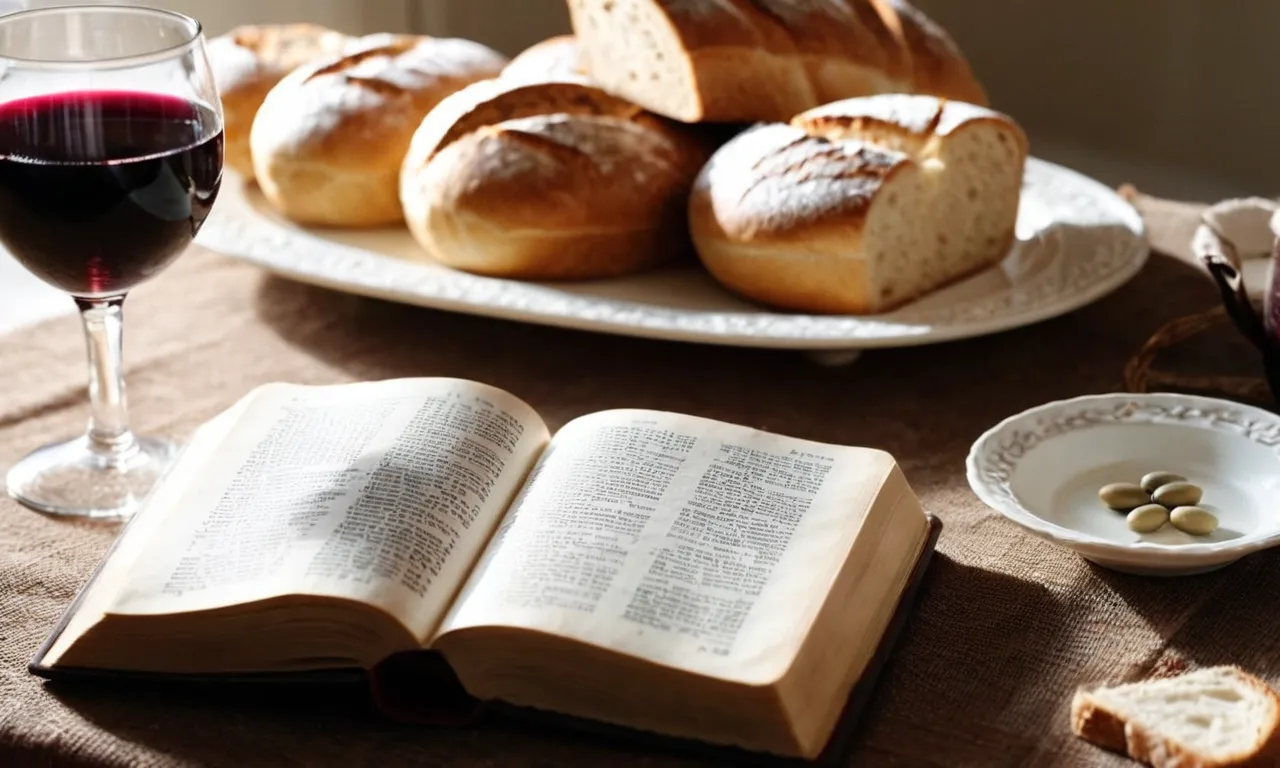How Often Should You Take Communion According To The Bible
Communion, also known as the Lord’s Supper or Eucharist, is an important Christian ritual where believers consume bread and wine (or juice) in remembrance of Jesus’s death and resurrection. But how often should communion be taken?
The Bible does not give a definitive rule, but examining relevant passages can help determine what is appropriate.
If you’re short on time, here’s a quick answer: the Bible does not prescribe a specific frequency. Most Christians take communion regularly as part of worship services, though practices vary across denominations.
The Origins of Communion
The Last Supper
According to the Bible, the practice of communion originated during the Last Supper, the final meal Jesus Christ shared with his twelve disciples before his crucifixion. As described in Matthew 26:26-29, Mark 14:22-25, Luke 22:14-23 and 1 Corinthians 11:23-26, Jesus broke bread and shared wine with the disciples, stating that these represented his body and blood.
He instructed them to “do this in remembrance of me” going forward.
This final meal held deep spiritual meaning. The breaking and sharing of bread represented Jesus’ impending sacrificial death on the cross. Partaking of the wine was symbolic of the blood Jesus would shed to atone for the sins of humanity.
Jesus established communion as an enduring sacrament for his followers to remember and commemorate his selfless love, redemptive life, death and resurrection.
Early Church Practice
The early Christian church continued the practice of celebrating communion regularly. The Book of Acts records that the first believers “broke bread” together in their meetings, likely meaning they shared communion.
Over the next few centuries communion became a core part of Christian worship services and mass.
In the early church, communion was celebrated each Sunday when Christians met for worship. It was typically celebrated in a corporate setting with believers partaking of the bread and wine together. Debates arose during this period about theological views of communion, especially regarding the nature of Christ’s presence in the sacrament.
But communion remained important as a proclamation of Christ’s death and a sign of continuing fellowship in the body of believers.
Today, communion continues to be a defining practice for Christianity. Though customs differ denominationally and regionally, regular communion remains a vital part of Christian spiritual life in community.
The ministry of communion is a means for believers to remember the love of Christ, be transformed by His grace, and unite together as one body in Him.
Important Biblical Passages About Communion
1 Corinthians 11:23-26
The passage in 1 Corinthians 11:23-26 contains the words of Jesus at the Last Supper and is one of the most important biblical passages about communion. Here is what it says:
For I received from the Lord what I also passed on to you: The Lord Jesus, on the night he was betrayed, took bread, and when he had given thanks, he broke it and said, “This is my body, which is for you; do this in remembrance of me.” In the same way, after supper he took the cup, saying, “This cup is the new covenant in my blood; do this, whenever you drink it, in remembrance of me.” For whenever you eat this bread and drink this cup, you proclaim the Lord’s death until he comes. (1 Corinthians 11:23-26)
This passage makes it clear that communion was instituted by Jesus himself at the Last Supper. By partaking of the bread and the cup, believers remember and proclaim Christ’s sacrificial death on the cross. The Lord directly commands his followers to “do this in remembrance of me.”
Therefore, communion is a vital way for Christians to commemorate Jesus’s death and look forward to his return.
Acts 2:42
The book of Acts describes the practices of the early church. Acts 2:42 provides a summary of how the first believers continually devoted themselves to the teachings of the apostles, fellowship, breaking bread, and prayer:
They devoted themselves to the apostles’ teaching and to fellowship, to the breaking of bread and to prayer. (Acts 2:42)
“The breaking of bread” here refers to the practice of communion, as Jesus had instituted it at the Last Supper. Partaking of communion was one of the four core activities that defined the early Christian community, along with instruction in the apostles’ teaching, fellowship, and prayer.
This shows that celebrating communion was an essential practice in the life of the early church.
Most biblical scholars agree that the early Christians likely celebrated communion every Sunday when they gathered for worship. This weekly observance of the Lord’s Supper has continued throughout history in most Christian traditions.
Frequency in Different Christian Traditions
Catholicism
In the Catholic Church, the faithful are required to receive Holy Communion at least once per year, during the Easter season. However, the Church encourages more frequent reception of the Eucharist. Many devout Catholics receive Communion daily or weekly.
The Church mandates preparation before receiving the Eucharist through prayer, fasting, and sacramental confession when needed. The required fast before Communion is one hour before receiving. Water and medicine do not break the fast.
Catholics believe the bread and wine become the actual body and blood of Jesus Christ during the celebration of the Eucharist. This is called transubstantiation. Therefore, the Eucharist is a profound way for Catholics to encounter Christ and unite their lives to him.
Protestantism
Frequency of Communion varies greatly among Protestant denominations. In churches that celebrate the Lord’s Supper infrequently, requirements for preparation to receive Communion may be more rigorous.
Many Protestant churches celebrate Communion monthly, such as during the first Sunday service of the month. Some churches offer Communion weekly as part of Sunday worship. In others, the frequency is quarterly or based on the church calendar.
Some Protestant traditions allow baptized children to participate in Communion, while others set an age requirement. Open or closed Communion may be practiced, depending on the denomination.
Most Protestants believe Christ is spiritually present in the bread and wine, rather than actually transformed into his body and blood. There is a wide spectrum of Eucharistic theology among denominations.
Eastern Orthodoxy
In the Eastern Orthodox Church, the Eucharist is called the Divine Liturgy. It is celebrated at least weekly on Sunday mornings and on holy days. Consecrated bread and wine are referred to as the body and blood of Christ.
Orthodox Christians are expected to prepare for Communion through prayer, fasting, alms giving, and periodic confession. Proper disposition and repentance for sins is required.
Infants and children participate in Communion fully after they have been baptized and chrismated (confirmed). The Orthodox Church allows infant Communion since baptism, chrismation, and the Eucharist are all mystically connected.
Frequency of reception varies by jurisdiction, but most Orthodox Christians receive Communion several times per month. Devout Orthodox may receive the Eucharist daily or weekly with proper preparation.
Personal Decision Within Biblical Bounds
When it comes to deciding how often to take communion, the Bible gives some guidance but ultimately leaves it up to each believer’s personal conviction. Here are a few principles to keep in mind:
There is no strict command or rule
Unlike commands about baptism or church gatherings, the Bible does not prescribe a specific frequency for taking communion. Jesus simply said to “do this in remembrance of me” (Luke 22:19). The early church took it regularly, but the Bible does not mandate a rigid schedule.
It should be done with proper discernment
Paul warned that taking communion in an “unworthy manner” can result in judgment (1 Cor. 11:27-32). This means we should have proper understanding and reverence for Christ’s body and blood. It’s not just a ritual – it requires heart preparation.
It can be done as often as desired
While some churches take communion monthly or quarterly, the Bible does not prohibit more frequent observance. Many believers take it weekly or even daily. Scripture teaches that as often as we eat this bread and drink this cup, we proclaim Christ’s death (1 Cor. 11:26).
It should be done corporately and individually
Communion is intended as a corporate act of worship for the church (1 Cor. 11:18-26). But this does not preclude taking it individually as well. There are examples of Jesus breaking bread in intimate gatherings and with his disciples alone.
Key factors to consider
In deciding frequency, consider factors like church tradition, scheduling, solemnity of the act, and personal devotion. The goal is to regularly remember Christ’s sacrifice in a worthy manner both individually and corporately.
Ultimately communion involves sacred mystery. The key is approaching Christ’s table with joy and discernment, whether weekly or monthly. The frequency matters less than the heart motive and attitude in taking it.
Communion as Remembrance and Proclamation
Taking communion allows us to remember and proclaim the sacrifice of Jesus Christ. As Jesus himself said during the Last Supper, “Do this in remembrance of me” (Luke 22:19). Each time we participate in communion, we remember and celebrate what Christ did for us on the cross.
There are several key things we are remembering and proclaiming when we take communion:
Christ’s Death
First and foremost, communion is a memorial of Christ’s death on the cross for our sins. The bread represents His broken body and the cup represents His shed blood. In taking communion, we remember and proclaim that Jesus died in our place to pay the penalty for our sins.
New Covenant
Communion also represents the new covenant established through Christ’s blood. Just as God made a covenant with the Israelites in the Old Testament, Christ’s death ushered in a new covenant of salvation by grace through faith (Luke 22:20).
The new covenant was prophesied by Jeremiah (Jeremiah 31:31-34) and instituted by Jesus.
Unity of Believers
The act of communally sharing in the Lord’s Supper expresses the unity we have as members of Christ’s body. Though we may be diverse in culture, race, age, and denomination, taking communion together reminds us of the unity we share in Christ (1 Corinthians 10:17).
It pictures the day when believers from every tribe, tongue and nation will gather together for the marriage supper of the Lamb.
Hope in Christ’s Return
In proclaiming the Lord’s death through communion, we also proclaim His second coming. Paul writes, “For whenever you eat this bread and drink this cup, you proclaim the Lord’s death until He comes” (1 Corinthians 11:26).
Communion sustains our hope in Christ’s return and the consummation of His kingdom.
Conclusion
In summary, the Bible does not mandate a specific frequency for taking communion. Most Christian traditions celebrate it regularly as part of worship services. Ultimately, the decision comes down to personal conviction within biblical bounds of remembrance and proclamation of Christ’s sacrifice.








